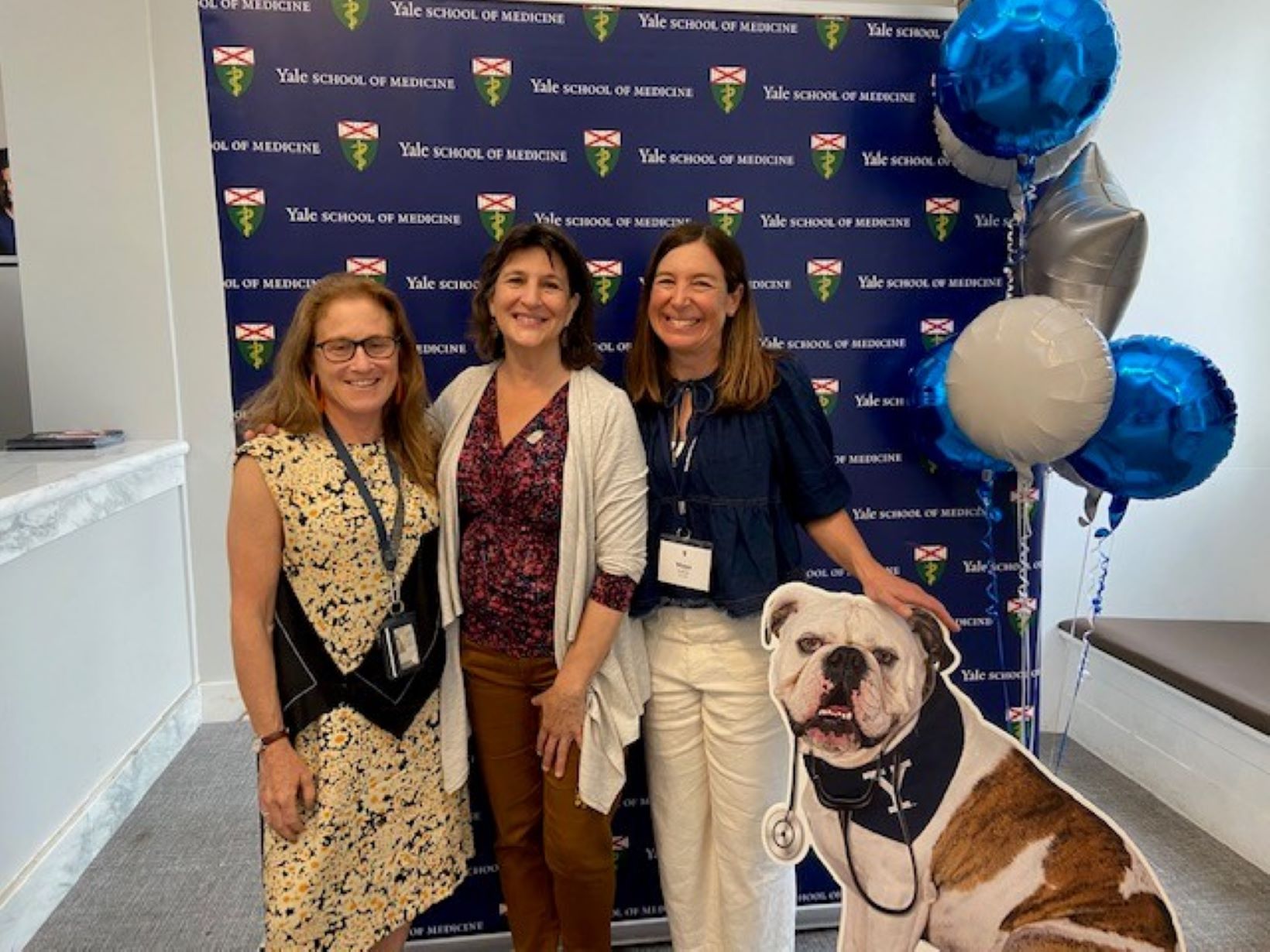YSM Reunion Theme: Staying Connected
After recently getting a firsthand view of one of the ways that aspiring doctors at Yale School of Medicine (YSM) now learn clinical skills, David Greene, MD ’93, had a succinct response.
“This is cool!” Greene said, as he watched students practice procedures on high-tech mannequins at the Yale Center for Healthcare Simulation. “I wish I was born 30 years ago so I could learn this way.”
Greene, a Florida-based otolaryngologist who specializes in facial reconstruction and sinus surgeries, was one of about 300 alumni and guests who gathered on campus for the 2023 YSM/Association of Yale Alumni in Medicine reunion. The event included campus tours, class dinners, YSM Dean Nancy J. Brown's State of the School address, and a 50th anniversary celebration for the Class of 1973. Those who graduated in years ending in ‘3 or ‘8 also celebrated anniversaries.
As Greene observed medical students using mannequin-based interactive simulators to practice everything from inserting IVs and nasogastric tubes to central venous catheters, he remarked that no such technology was available when he was in school.
"Everything we learned, we learned on each other, which is not optimal," he said. "We bloodied each other; we collapsed veins. It’s an extraordinary benefit to get to practice on something that is not a patient a hundred times before you do it on an actual patient."
Bill Flynn, MD '68, said that seeing the school's advanced medical technology for teaching was exciting, but so was meeting students.
Flynn toured the Clinical Skills Exam Room practice spaces, where students and staff showed some of the technology, such as portable ultrasound machines, now being used as teaching tools. Flynn, a surgeon who practices in the Boston area, said that ultrasound technology has become vital in diagnosing patients, including those suffering from blunt force trauma, where locating the injury may be difficult.
Just as enjoyable for Flynn was seeing students' enthusiasm for medicine. He said that talking to students who are excited to become doctors was gratifying—especially considering recent news stories about physician burnout, which Flynn said can be discouraging.
"I see studies about something [burnout] that didn't exist when I was in school," Flynn said, adding that the students he met were undeterred by such reports.
Renewing Meaningful Connections
The alumni said they were not only happy to see what is new at Yale but also to reconnect with classmates. To renew those connections, many alumni made considerable effort, traveling to New Haven from 31 states as well as Canada and the United Kingdom.
One such traveler was Maya Lodish, MD ‘03. "Because I'm in California, I haven't seen many of my friends from here in forever, so it's nice to come back," she said.
Lodish, a professor of pediatrics and division chief of pediatric endocrinology at the University of California, San Francisco, also returned in 2013 for her 10th reunion. That visit led to a fruitful collaboration with Dennis D. Spencer, MD, the Harvey and Kate Cushing Professor Emeritus and senior research scientist of neurosurgery, and Cynthia Tsay, MD '18, chief fellow in gastroenterology at Johns Hopkins Hospital.
The three of them extracted DNA from human brains that were collected by pioneering neurosurgeon Harvey Cushing during the early 20th century and are now housed at Yale's Cushing Center. The three physicians found genetic evidence in brain tissue linking one of Cushing's patients with conditions Lodish has seen in her own practice.
Lodish said she planned to meet with Cushing Center Coordinator Terry Dagradi during reunion weekend to discuss more projects using its collection.
Discussing Trust and Other Timely Topics
Reunion activities also extended beyond what is happening at YSM. Alumni gathered on the lawn in front of Harkness Hall for an hour-long conversation with Dhruv Khullar, MD '14, a physician and assistant professor of health policy and economics at Weill Cornell Medical College, and Howard Forman, MD, a professor of radiology and biomedical imaging, public health, management, and economics at Yale.
Their wide-ranging discussion covered advancements in artificial intelligence that may support and challenge doctors; how Khullar, who is also a contributor to The New Yorker, has used writing to help lay audiences understand complex health issues; and the importance of encouraging medical students to consider careers in primary care.
A recurring theme in their presentation was a need for more trust in medical institutions. Khullar and Forman agreed that the public's trust in the medical profession, in general, has fallen over time but pointed out that many people still report having high levels of trust in their doctors.
Khullar attributed the erosion of people's trust to the greater availability of health information from non-medical sources; heightened awareness of conflicts of interest; the corporatization of medicine; and skyrocketing costs for treatment.
"It's hard to trust a system in which one illness can put you into personal bankruptcy," Khullar said.
He said missteps by politicians and public health officials during the early stages of the COVID-19 pandemic also may have made people more skeptical of medical leaders. Acknowledging uncertainty is vital when communicating in a public health crisis, Khullar said. Primary care physicians may be especially helpful in rebuilding public trust, as people tend to see their primary care doctors relatively often, Khullar said.
"Trust has fallen in health care institutions and the medical profession, but people still trust their doctors," he said.
